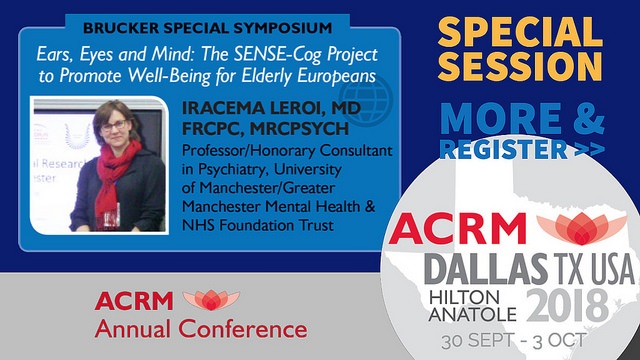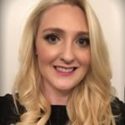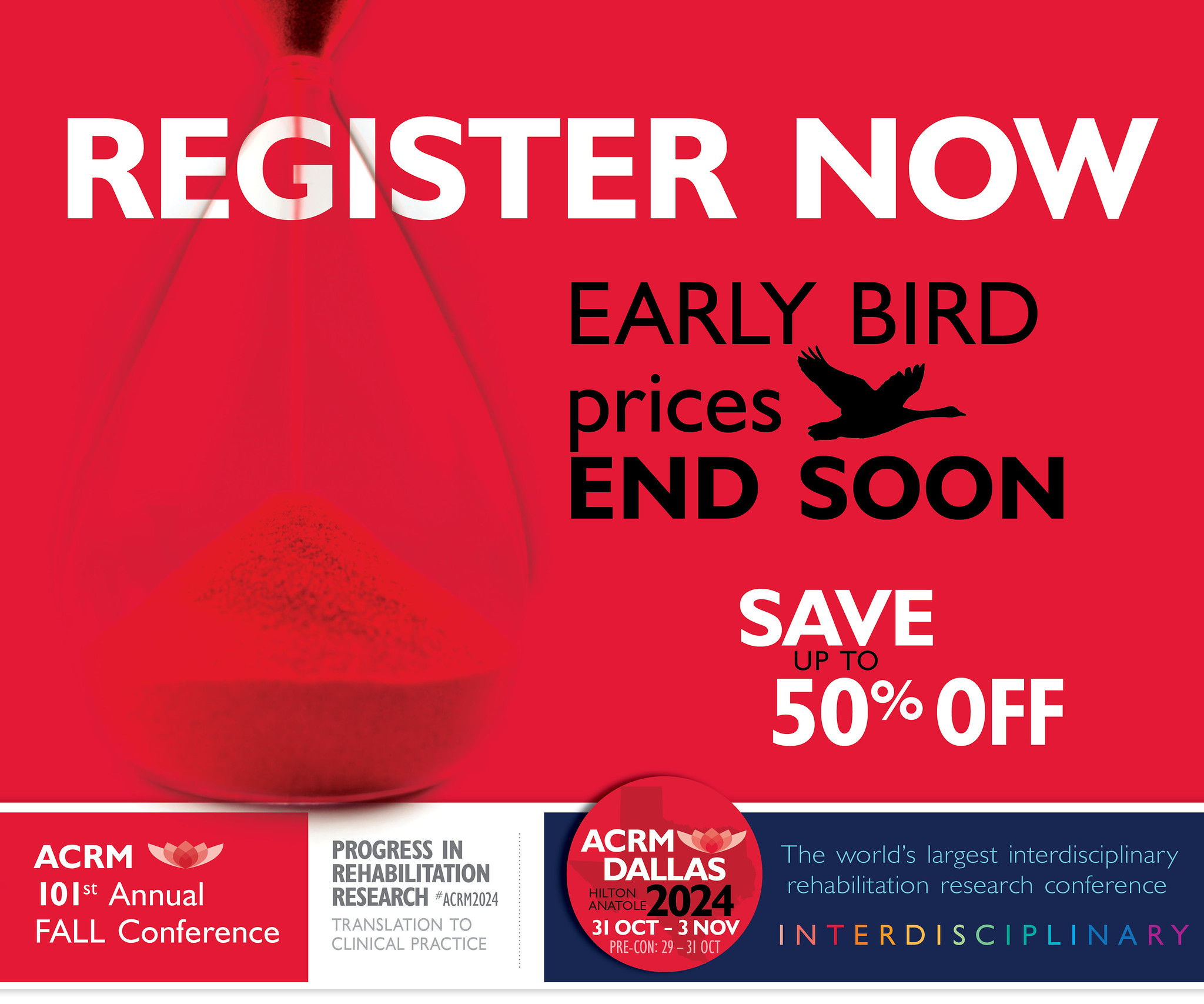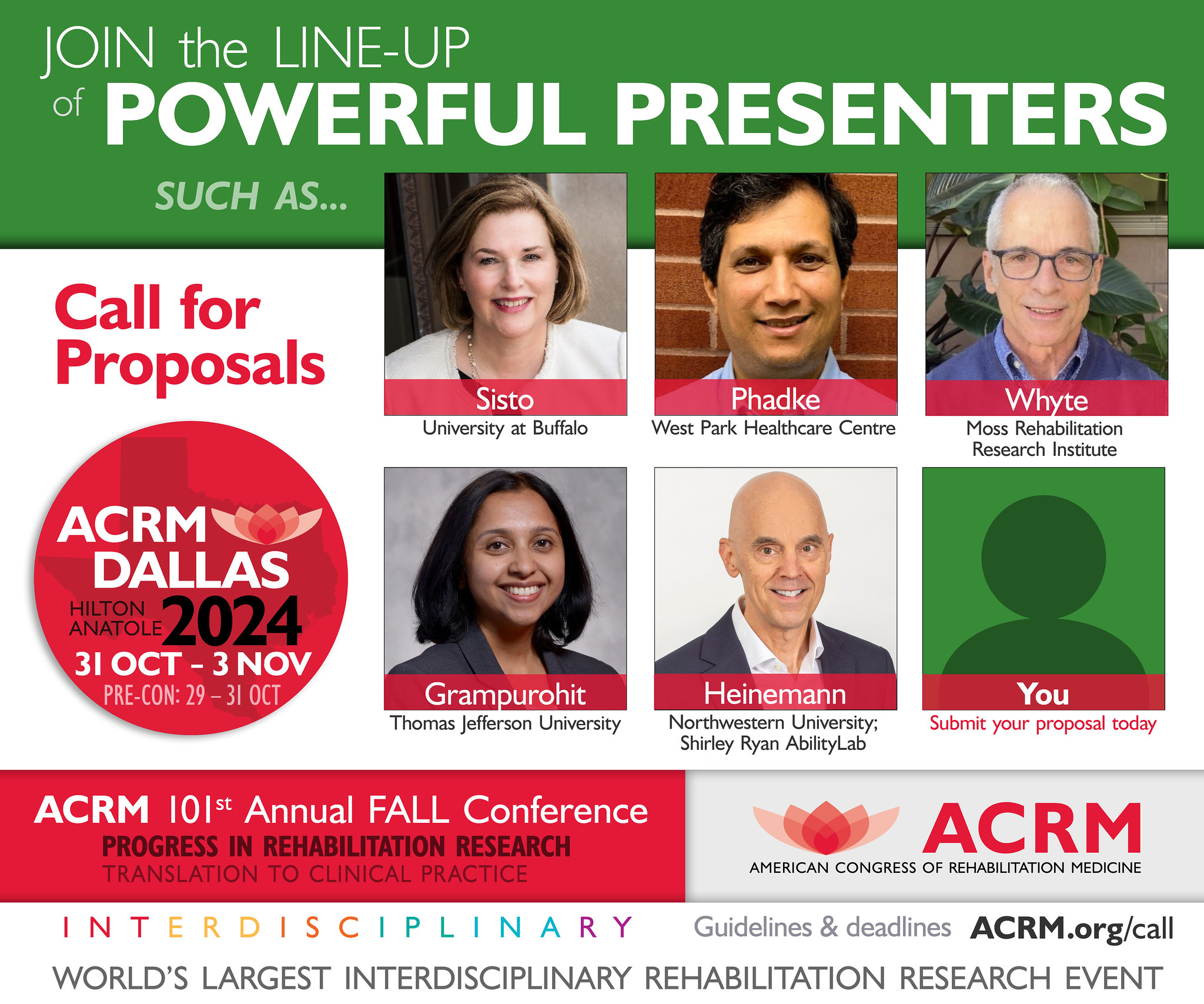
Interview with the Brucker Award Winner & Speaker
Iracema Leroi, BDc, MD (Canada), MRCPsych, FRCPC, MD (UK), DABPN, is a Professor of Psychiatry in Aging and Dementia at the University of Manchester in the UK and a consultant geriatric psychiatrist working in England’s National Health Service (NHS). She initially trained in medicine and psychiatry in Canada before undertaking sub-speciality training in neuropsychiatry at Johns Hopkins in Baltimore. She moved to the UK in 2002 to work in dementia services. Her main research interest has been to investigate ways to improve outcomes for people with mental health problems or cognitive impairments due to a neurodegenerative disorders. She now spends half her time diagnosing and supporting people with cognitive impairment and the other half engaged in clinical research and teaching.
Tell us about your involvement in the field of Rehabilitation.
We have yet to find a cure for Alzheimer disease and other neurodegenerative conditions, which lead to dementia. Some believe that we may never do so, or that this goal is but a mirage. In the meantime, we have to support people with dementia to live to their fullest potential in the face of deteriorating cognitive and functional ability. During my career as a ‘dementologist’, I have come to realise that my main aim should be to identify the impairments that limit activity and daily tasks for someone living with dementia, and to help those individuals optimise their physical, cognitive and functional ability to enable greater participation and quality of life. Often, this may be through adapting their personal and environmental circumstances. For example, enhancing sensory function through corrective aids, communication training, and environmental manipulation can all improve the quality of life of someone with dementia. This is our aim in the SENSE-Cog programme.
I recently had a sabbatical in Japan, a super-aged nation where more than 20% of the population is over the age of 65. In Japan there is a huge emphasis on ‘active aging’ and the need to maintain health and wellbeing over the life course. Here I saw rehabilitation medicine in action. Rehabilitation medicine was initially developed to meet the needs of working age adults, but with the aging of the population and people living for many years with deteriorating function, I believe that rehabilitation medicine can play a vital role for the population with dementia as well.
Tell us about your current position and/or research.
I oversee a large portfolio of clinical trials of medicinal agents for Alzheimer disease and other neurodegenerative conditions, as well as studies developing and evaluating complex psychosocial interventions to improve outcomes in dementia. Recently, we have started to focus on comorbidity associated with aging, particularly the interplay of aging-related hearing, vision and cognitive impairment. This has led to the SENSE-Cog programme, which is a 5 year EU-funded programme of work examining the epidemiology, assessment, health economics and management of hearing and vision impairment in dementia (www.sense-cog.eu). The programme involves 7 EU countries and 27 partners. Through this work we have developed and field tested a novel intervention, ‘Sensory Support Therapy’, which aims to improve quality of life for people with dementia and their care partners by augmenting hearing and vision. We have found that providing glasses and hearing aids is insufficient to effect change in people with dementia. Instead, it is necessary to provide additional support through fostering adherence to the aids, communication training, and improving the sensory environment. All these elements can be tailored to the specific needs of the individual. We are undertaking a full scale randomised controlled trial of the intervention in five EU countries: UK, France, Greece, Ireland and Cyprus.
Who has been one of the most influential people throughout your career and why?
A few years ago I came across the work of Dr Atul Gawande, a surgeon at Brigham and Women’s Hospital, who delivered the BBC’s 2014 Reith Lectures in a series, entitled ‘The Future of Medicine’. In these lectures he argued that much of failure in medicine is not due to a lack of knowledge, but may be due to a failure to use existing knowledge appropriately. This is the basis of Improvement Science, which I believe has huge potential in coming years, as we struggle to optimise our limited resources in the face of every increasing demand. Dr Gawande also posited the idea that the field of medicine should move beyond its focus on combatting disease and prolonging life, and instead focus on wellbeing – ‘on protecting, insofar as possible, people’s abilities to pursue their highest priorities in life’. Working in dementia underscores this ethos. In the past 20 years, over 99% of trials focussing on a ‘cure’ for Alzheimer disease have failed. Perhaps the solution lies instead in shifting away from the notion of ‘disease modification’ to ‘living better with dementia’.
What are you looking forward to in your near future?
I will soon be moving to Dublin to join the Global Brain Health Institute (GBHI), a joint venture between Trinity College Dublin and the University of California, San Francisco. GBHI aims to mitigate the global scale and impact of dementia by creating a network of new leaders in the field to translate research evidence into effective policy and practice. I am very excited to be part of this endeavour, particularly as it will help me consolidate my collaboration with colleagues working in dementia in South Asia. Over two-thirds of the population living with dementia currently reside in lower and middle income countries, where the recognition of dementia and support for people with the condition may be very limited. There is tremendous potential to change this by developing and strengthening partnerships with more established centres in industrialised countries.
What are some challenges you have encountered in your field?
Until recently, dementia as a condition has been invisible. Finding adequate funding to support clinical research and develop services has been difficult. Thankfully, in many countries this is changing and with the worldwide introduction of national dementia strategies, policy makers and governments have significantly enhanced their support for dementia. However, the focus on prevention of dementia is still sadly neglected and widespread understanding of healthy living as a potential modifiable risk factor for dementia is still lacking. This needs to be the new focus. If a cure remains elusive, our vision of a ‘dementia-free future’ can only be realised through prevention.
What do you enjoy doing in your free time?
My strength lies in being ‘cross-disciplinary’, as my work with SENSE-Cog attests. This trait is evident in my personal life. Although my background is competitive swimming, I have recently started training for Masters’ Modern Pentathlon. This is a remarkable sport, developed by Baron Pierre de Coubertin for the first modern Olympics to epitomise the ‘perfect athlete’. Success in Modern Pentathlon requires concentration and mental discipline for pistol shooting, stamina and strength for running, speed and skill for swimming, cunning and rapid reflexes for fencing, and skill and courage for show jumping. Mastering Modern Pentathlon is an elusive goal, but I find striving toward that goal a great life challenge. And…I never get bored.
Interview with a New Member of the International Networking Group

Marissa Barrera
Marissa A. Barrera, MS, MPhil, MSCS, CCC-SLP, PhD, is a medical Speech-Language Pathologist and Multiple Sclerosis Certified Specialist who specializes in the evaluation and treatment of individuals with neurological conditions. She is a leading expert on the use of rehabilitation modalities for speech and swallowing rehabilitation, including Neuromuscular Electrical Stimulation (NMES), Electrical Triggered Stimulation (ETS), Surface Electromyography (sEMG) and Neuromuscular Taping.
As a researcher and author, Dr. Barrera has lectured around the globe on a wide range of clinical care topics ranging from dysphagia, NMES, motor speech disorders, cognition and neurodegenerative diseases. She has over 70 research abstracts and has been featured in Women’s Health, Vice Magazine, ADVANCE for Speech-Language Pathology and MTV.
She currently services as the Program Director at Yeshiva University’s graduate program in medical speech-language pathology. She is member of the prestigious Clinical Advisory Committee for the MS Society and the Multiple Sclerosis Foundation Advisory Board. She also serves as distinguished faculty for the Consortium of Multiple Sclerosis Centers.
Dr. Barrera is also the founder and owner of the New York Neurogenic Speech-Language Pathology and the ASPIRE CENTER for Health + Wellness, with offices in both Manhattan and Brooklyn.
What does it mean to be culturally sensitive and why is this important to you?
As a health care professional working in New York City, the melting pot of the world, figuratively and literally, it is my responsibility to be mindful of both ethnic and cultural diversity. I strive to be knowledgeable and aware of traditions outside of my own identifiable cultural group, because as a modern healthcare clinician it is my responsibility to be aware of differences in culture, economic status, religious beliefs, weight/height, gender, sexual orientation and much more. It is essential that we take the time to research and learn about each of our patients as their diverse backgrounds and cultural beliefs often influences the ways in which we deliver care. Potential influences include decision-making styles, healing traditions, spirituality, food/diet limitations, and expectations about privacy/disclosure, status/hierarchy, socio-economic status, personal boundaries and physical contact. Given this complexity, I believe it is the responsibility of graduate institutes and professional organization to not only provide the initial training, but also the subsequent training to give the modern healthcare workforce the necessary skills to successfully navigate the plethora of culturally sensitive issues.
What countries have you visited and what impact has each country had on you?
Some of the countries I had the privilege of teaching and/or collaborating in patient care include: Columbia, Puerto Rico, the Netherlands, Germany, Ireland, Spain, Greece, Cyprus, Saudi Arabia, Qatar, China/Hong Kong, and Taiwan.
With each invitation to teach abroad, I view it as a blessing. I believe it is my responsibility to proudly represent the high-quality academic and clinical training that I received in the United States and to pay it forward to global clinicians eager to learn more in order to best help their patients. Each country has had a huge impression on me both personally and professionally. Teaching and working with patients in mainland China stands out as one of the most profound moments in my life. Despite there being a plethora of cultural and theoretical differences in our approaches to patient care, I was able to connect with physicians, clinicians and families because our common goal to improve and restore quality of life.
Outside of my visits to China, teaching in Greece several times per year affords me the opportunity to closely track clinical cases and monitor progress, which is incredibly rewarding. With the help of FaceTime and Skype, my ability to consult on cases and provide specialized support is just one video chat away, making the distances between providers negligible.
What impact do you feel you’ve made in these countries?
I would like to think that with each individual I’ve encounter, I leave behind my intense passion for my profession and the notion that we must take care of one another; we are all global citizens.
In certain countries, Greece, as one example, I had the privilege of teaching the very first clinician focused electrical stimulation course, introducing the entire country to a modality that can dramatically improve the quality of life of patients with swallowing dysfunction. Fast forward years later, using modalities to treat swallowing is one of the most sought after rehabilitation techniques. This brings me immense pride.
What are some challenges you have encountered in your field?
Challenges are something that I encounter on a daily basis, from fighting with insurance companies regarding medical necessity to balancing my academic and clinical schedule. When working in an international arena, most frequently, I experience challenges in the M.D./PhD hierarchy. In the United States there are a fair number of speech-language pathologists who have achieved their doctorate and work with a very high-level of specialization. This is actually very infrequent outside of the US, where most SLPs have on average 4.5 years of training, without a graduate degree let alone a terminal degree. In select institutions and countries, I have encountered gender bias, age bias, and education bias, often being subject to hurtful comments such as, “she’s only a speech pathologist” or “you are not a real doctor”.
What are some current or upcoming projects in which you are currently involved?
Time permitting, I enjoy conducting research studies investigating motor speech and swallowing dysfunction associated with neurodegenerative diseases. Most recently I completed a multidisciplinary study investigating the effects of physical fatigue on expressive language and word finding skills in individuals with Multiple Sclerosis.
This summer, I am very proud to be organizing and teaching a one-of-a-kind dysphagia-training seminar in Crete, Greece. This four day intensive training seminar is intended to give clinicians from all over the globe not only the theoretical foundations for treating patients with complex swallowing disorders, but also empowering them with the hands-on clinical skills necessary to improve swallowing safety. The seminar will be collaboration between multiple institutions in the United States and Greece, and will hopefully be the first of an annual training series to take place in the Mediterranean.
Please tell us a little about your journey.
In kindergarten, if you asked me what I wanted to be when I grew up, my answer was, “a scientist”. In 1998, as a high school junior I enrolled in a child psychology course that introduced me to the field of speech pathology and audiology. I was hooked. I proudly attended college majoring in speech-language pathology with minors in education and bioethics while simultaneously working at the Columbia University’s Mailman School of Public Health as a researcher manager investigating bioterrorism. I remained at Columbia University for six years including while I was pursing my masters degree in speech-language pathology and well as during the first year of my doctoral program. In 2006, I had an opportunity to work as s SLP in a hospital setting that changed my life forever. While waiting for my patient to finish her occupational therapy, I was exposed to modalities, more specifically, neuromuscular electrical stimulation for the very first time. I was amazed how a patient who I had been treating for several weeks could feed herself when wearing these two electrodes on her forearm. I said to myself, if this technique could help a patient better activate their arm muscles, why couldn’t this technique also better activate the muscles responsible for swallowing. At that moment, I began a long and hard journey educating myself on all of the modalities that PTs and OTs learn a part of their standard graduate education but sadly SLPs do not. My passion for teaching SLPs and allied health professionals on how to effectively incorporate modalities (NMES, ETS, sEMG and Neuromuscular Taping) into their treatment sessions to improve the quality of life for their patients and improve clinical outcomes has afforded me the privilege to travel all over the world. To date, I’ve trained over 4000 clinicians globally with my multidisciplinary methods for improving motor speech and swallowing dysfunction for persons with neurological conditions.
In addition to the development and implementation of clinical programs globally, I am the Program Director and Assistant Professor at Yeshiva University’s graduate program in SLP where I teach a majority of the coursework focused on the medical aspects of speech pathology. I have been a graduate school professor for over a decade teaching in some of the finest institutions in New York including, Columbia University my alma mater.
In addition to my international teaching and academic position, I own and operate two outpatient multi-disciplinary neurological practices in New York City where I supervise 5 medical SLPs, 10 graduate students and oversee the treatment of approximately 800 patient visits per month.
After spending much of my adult life focused on my career and patients, I am proud to say that I am newly married, working harder then ever, enjoying life and looking forward to the adventures that await me.









